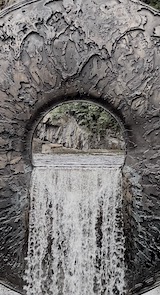
Death Walks Round the World
I could remember a little painted toy house, with four black windows, a red triangular door, and a pathway leading up to it. Right in the centre was a red circle which looked like a nose, but I suppose it could have been a stained glass window. When I was six, I saw it as a nose, because everything has a face then.
Now, seven years later, I was on the beach, self-conscious in a new maroon pair of swimming trunks. My big brother had a similar pair, but he seemed to fill his while I rattled around inside mine, making echoes I knew everyone on the beach could hear. He was not yet dry from the last swim when I followed him down to the rocks for another. The coast had been eaten out of the cliffs and the pools held lurking unknowns, which made my hands tingle if I dipped them in too far. Even the seaweed stretched to reach my feet when I trod near it, although I didn’t mind it in the sea.
As we walked out, the waves soon reached my chest, and the water was tugging at the rocks and throwing bits of sea-stuff everywhere. I couldn’t see the bottom, but I knew where all the sandy parts were. I found it mildly surprising that my brother did not, and shouted at him to keep away from the rocks. Why, if he was that much older, could he not remember the arrangement of rocks and sand? I could see it now as if the tide were at full ebb. I had walked out one day with the silent waves in the distance, enjoying the thought that in six hours’ time the sea would be thirteen feet above my head—and there I was, fully clothed and dry.
I could not make him hear me now so instead, I willed him to move to the left, struggling to do so myself. A minute later, we swam in the relative calm beyond the waves, which sounded as if they were running backwards behind us.
We saw it at the same time; a bright orange air-bed, floating some forty yards out to sea. It had just rounded the cliff edge that marked the boundary of this cove, and there was no-one nearby.
By now, death had walked calmly round the world so many times that the sea no longer took the trouble to get it wet as it crossed the ocean floor. It didn’t surprise me that it was wearing a top hat and a huge coat, both midnight blue. And it seemed entirely correct that its face was a house with four windows, a triangular door-mouth and a red stained-glass nose. It walked out of the sea as if it were merely keeping its place as the world turned. I saw it—passing no more than twelve feet away—after my brother had disappeared under the water. He was pretending that the currents didn’t bother him by swimming out to rescue an orange air-bed. The tide threw up his empty body and it was found the next day. I wanted to brush the sand off his face, because if I were alive in his place it would be troubling me.